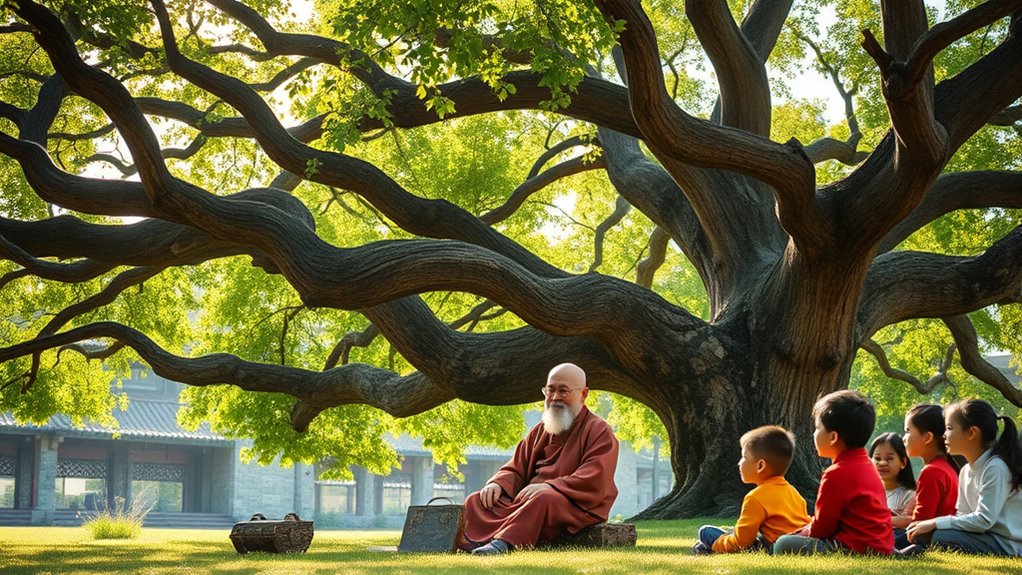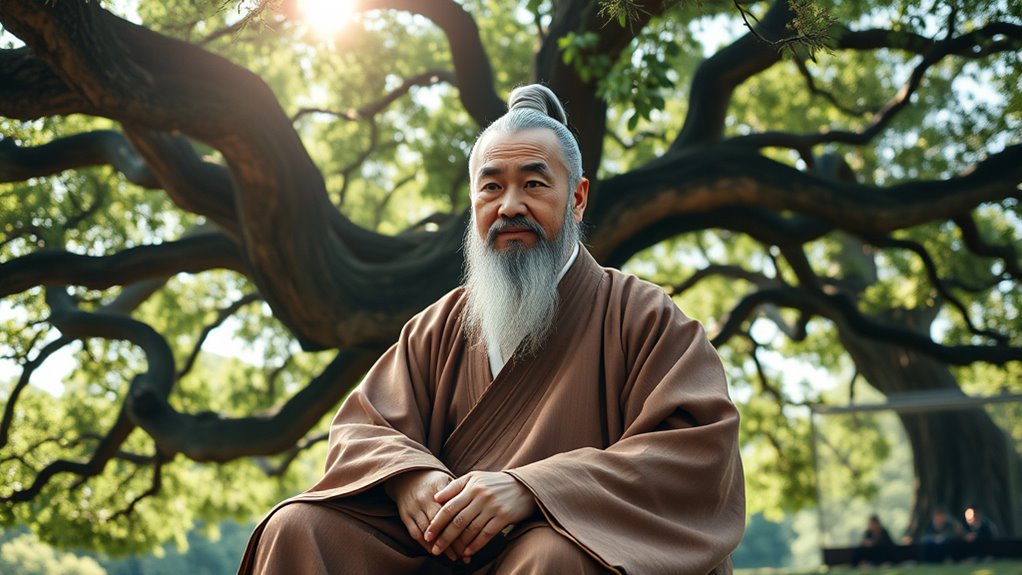Confucius believed that education is key to building confidence, hope, and peace by nurturing moral virtues like benevolence, righteousness, and integrity. He emphasized lifelong learning, encouraging you to stay curious and continually improve yourself. Through moral development, you can foster trust and respect, creating harmony within society. Embracing inclusivity and shared values, education becomes a powerful tool for collective growth and stability. If you explore further, you’ll discover how these teachings can shape a better world.
Key Takeaways
- Confucius emphasized that education cultivates virtues like benevolence and righteousness, fostering moral confidence and inner peace.
- Continuous learning develops hope by demonstrating that growth and improvement are always possible.
- Moral development through education builds social harmony, reducing conflicts and promoting peaceful coexistence.
- Inclusivity in education encourages collective progress, strengthening trust and cooperation within communities.
- Education nurtures wisdom and virtue, guiding individuals and society toward stability, harmony, and lasting peace.

Confucius believed that education is fundamental to personal growth and social harmony. When you pursue learning, you’re not just acquiring facts—you’re shaping your moral character and becoming a better person. His teachings emphasize that moral development is at the heart of education, guiding you to cultivate virtues like benevolence, righteousness, and integrity. These qualities are essential for creating trust and respect among people, fostering a peaceful society. As you deepen your understanding of right and wrong, you develop confidence in your moral compass, which in turn fosters hope for a better world. Education, in his view, isn’t a one-time event but a lifelong journey. By committing to lifelong learning, you continually refine your character and expand your knowledge, staying adaptable in a changing world. A commitment to ongoing learning aligns with the belief that education is a process that nurtures virtue and wisdom over time.
Confucius believed that the process of learning should be ongoing, and that you should never see education as complete. This mindset encourages you to stay curious, to ask questions, and to seek wisdom throughout your life. When you view education as a lifelong pursuit, you build resilience and hope, knowing that growth is always possible. This perspective also breeds confidence—confidence not just in your skills, but in your capacity to improve yourself and contribute positively to society. Confucius saw education as a tool to nurture the inner virtues that promote social harmony and peace. By committing to moral development and continuous learning, you’re actively working towards a more just and compassionate community.
Moreover, Confucius’s approach to education emphasizes that everyone has the potential for growth, regardless of background or status. When you embrace this inclusive view, you foster hope not only for yourself but for others around you. You learn to see education as a way to uplift and unite people, creating bonds rooted in shared values and understanding. This sense of collective moral progress leads to greater peace, as conflicts diminish and cooperation takes their place. When you prioritize moral development through lifelong learning, you contribute to cultivating an environment where confidence, hope, and peace flourish side by side. Confucius’s teachings remind you that education is a powerful means to nurture the best in yourself and others, ultimately guiding society toward harmony and stability.
Frequently Asked Questions
How Can Confucius’s Teachings Be Applied in Modern Classrooms?
You can apply Confucius’s teachings in modern classrooms by focusing on student motivation and thoughtful curriculum design. Encourage students to see their value and potential, fostering confidence and hope. Use a curriculum that emphasizes ethical values, respect, and community, creating a peaceful learning environment. Inspire curiosity and self-reflection, helping students develop a love for learning while feeling supported and motivated to grow both academically and personally.
What Role Does Morality Play in Confucius’s Educational Philosophy?
Morality is the guiding star in Confucius’s educational philosophy, shaping your moral development and character cultivation. It’s the seed you plant in young minds, nurturing virtues like honesty, respect, and kindness. As you grow these qualities, they become the backbone of a harmonious society, illuminating your path and inspiring others. Morality isn’t just a lesson; it’s the heartbeat that keeps education alive and meaningful.
How Does Confucius View the Importance of Student-Teacher Relationships?
You should understand that Confucius views student-teacher relationships as essential, emphasizing mutual respect and trust. He believes that a strong bond fosters a supportive environment for learning and personal growth. Teachers serve as lifelong mentors, guiding students not just academically but morally as well. By cultivating these respectful relationships, you create a foundation for hope, confidence, and peace, ultimately shaping individuals who contribute positively to society.
Are Confucius’s Ideas About Education Relevant Across Different Cultures?
Yes, Confucius’s ideas about education are still relevant across different cultures because of their focus on moral development, respect, and lifelong learning. His principles promote cultural adaptation by emphasizing core values that resonate globally. You can see their universal applicability in fostering better understanding, hope, and peace, making his teachings valuable regardless of cultural differences. His approach encourages empathy and personal growth worldwide.
What Challenges Might Educators Face When Implementing Confucian Principles Today?
You might find that cultural resistance and modern skepticism pose challenges when implementing Confucian principles today. People could be wary of traditional authority or doubt its relevance in a rapidly changing world. To succeed, you’ll need to gently bridge these gaps, emphasizing shared values and adapting teachings to fit contemporary contexts. Patience and openness will help you foster respect while promoting confidence, hope, and peace through education.
Conclusion
By embracing Confucius’s teachings on education, you nurture confidence, inspire hope, and foster peace within yourself and others. When you seek knowledge, you build strength; when you practice humility, you cultivate understanding; when you share wisdom, you spread harmony. Remember, education isn’t just about facts; it’s about shaping character. So, choose confidence, nurture hope, and promote peace—because through education, you create a better world, starting with yourself and extending to everyone around you.
Joy, as our Editor in Chief, ensures the highest standard of content. Her talent in writing is complemented by her attention to detail and passion for literature and culture. Joy’s expertise and love for the English language shine through in her editorial work, making each piece a testament to quality and clarity.










